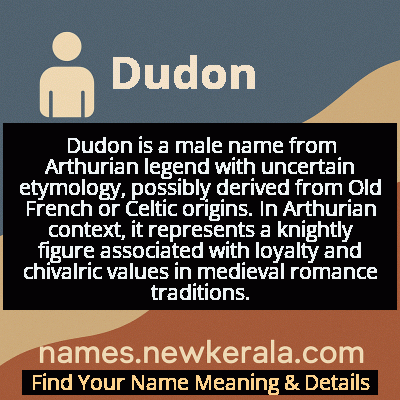Dudon Name Meaning & Details
Origin, Popularity, Numerology Analysis & Name Meaning of Dudon
Discover the origin, meaning, and cultural significance of the name DUDON. Delve into its historical roots and explore the lasting impact it has had on communities and traditions.
Name
Dudon
Gender
Male
Origin
Arthurian
Lucky Number
4
Meaning of the Name - Dudon
Dudon is a male name from Arthurian legend with uncertain etymology, possibly derived from Old French or Celtic origins. In Arthurian context, it represents a knightly figure associated with loyalty and chivalric values in medieval romance traditions.
Dudon - Complete Numerology Analysis
Your Numerology Number
Based on Pythagorean Numerology System
Ruling Planet
Uranus (Rahu)
Positive Nature
Strong sense of order, loyal, practical, and disciplined.
Negative Traits
Stubborn, overly serious, rigid, and prone to feeling restricted.
Lucky Colours
Blue, gray.
Lucky Days
Saturday.
Lucky Stones
Blue sapphire.
Harmony Numbers
1, 7, 8.
Best Suited Professions
Managers, engineers, accountants, organizers.
What People Like About You
Dependability, discipline, practicality.
Famous People Named Dudon
Dudon of Saint-Quentin
Chronicler and Historian
Wrote 'History of the Normans', preserving crucial accounts of early Norman history and culture
Sir Dudon
Knight
Knight of the Round Table in Arthurian legend, known for loyalty and martial prowess
Dudon de Conteville
Nobleman
Historical Norman aristocrat during the period of Norman expansion and consolidation
Name Variations & International Equivalents
Click on blue names to explore their detailed meanings. Gray names with will be available soon.
Cultural & Historical Significance
Historically, the name gained significance through Dudon of Saint-Quentin, an 11th-century chronicler whose work 'De moribus et actis primorum Normanniae ducum' (On the Customs and Deeds of the First Dukes of Normandy) provides invaluable insights into Norman history and culture. This historical Dudon helped preserve the memory of Norman achievements and contributed to the formation of Norman identity during a crucial period of state-building. The dual presence of the name in both legendary and historical contexts illustrates how medieval names could traverse the boundaries between fact and fiction, serving both as markers of real historical figures and as characters in the evolving mythology of European culture.
Extended Personality Analysis
Individuals bearing the name Dudon typically exhibit characteristics of reliability, quiet strength, and deep-seated loyalty. These traits align with the name's Arthurian origins, where knights were expected to demonstrate unwavering commitment to their lords and causes. A person named Dudon would likely approach life with methodical precision, valuing stability and tradition over fleeting trends or impulsive decisions. Their strength often lies in their consistency and ability to remain steadfast during challenging circumstances, making them pillars of support in their communities and relationships.
This name suggests someone who prefers substance over showmanship, finding satisfaction in meaningful contributions rather than public recognition. They likely possess a strong sense of duty and historical awareness, often showing interest in preserving traditions and understanding the lessons of the past. While not necessarily seeking the spotlight, their quiet competence and reliability make them invaluable in both professional and personal contexts. The name carries an air of antique dignity that might influence the bearer to develop a thoughtful, measured approach to life's challenges, combining traditional wisdom with practical problem-solving abilities.
Modern Usage & Popularity
In contemporary naming practices, Dudon remains an extraordinarily rare choice, primarily confined to families with specific interests in Arthurian legend, medieval history, or Norman heritage. The name has never achieved mainstream popularity and does not appear in modern birth name statistics from any English-speaking country. Its usage is most frequently encountered in academic circles, historical reenactment communities, or among enthusiasts of medieval literature. In recent decades, there has been no significant trend toward increased usage, and the name maintains its status as a distinctive, historical artifact rather than a living naming tradition. When used today, it often serves as a middle name or appears in fictional contexts that draw upon Arthurian themes, preserving its connection to medieval romance while remaining outside contemporary naming conventions.
Symbolic & Spiritual Meanings
Symbolically, Dudon represents the enduring power of tradition, loyalty, and historical continuity. The name evokes the medieval ideal of the steadfast companion—the reliable figure who supports greater endeavors without seeking personal glory. Metaphorically, it suggests the importance of foundation and preservation, much like the historical chroniclers who ensured cultural memory would survive across generations. In a broader sense, Dudon symbolizes the quiet strength that underpins great achievements, reminding us that history is shaped not only by famous leaders but also by dedicated supporters and preservers of knowledge. The name carries connotations of bridge-building between past and present, serving as a living connection to medieval values of honor, duty, and cultural transmission.

